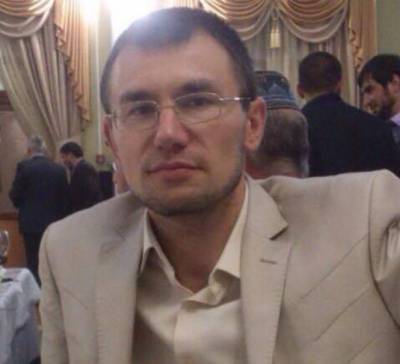• Topics / Deported peoples
• Topics / Human Rights Abuses in Russian-occupied Crimea
‘Terrorist’ charges to silence Crimean Tatar Human Rights Activist

Russia’s calculation in crushing dissent in Crimea has proven disturbingly accurate. Ignore protest, hiding even world-renowned filmmaker Oleg Sentsov far from the media and create a virtually total blockade on information in Crimea. You can then carry out a brazen abduction of prominent Crimean Tatar figure like Erven Ibragimov, and continue imprisoning people virtually indefinitely on surreal chances with little protest at all from the West.
A court in Russian-occupied Crimea last week yet again extended the imprisonment of Emir-Huseyn Kuku, a member of the Crimean Contact Group on Human Rights and three other Crimean Muslims: Muslim Aliev; Envir Bekirov and Vadim Siruk. The only thing at all unpredictable about the hearing on June 7 was that the detention order was for 3 months, rather than the customary 2. Otherwise, the same automatic extension, with the prosecutor arguing that the men, all fathers with young children, could ‘abscond’ or try to influence ‘witnesses’, and the court scarcely listening to the defence. The same crowded corridor with wives, children and other family members hoping to at least see the men who have all been in custody now since Feb 11 this year.
There has been a lot reported here about the grotesque ‘terrorism’ charges which these four men and 10 other Crimean Muslims are facing. The arrests after armed raids and searches of ordinary Muslim households and the ‘trials’ are all carried out in bulk, with little even known about the men taken into custody.
The calculation is clear: create the impression that Crimean Muslims, most of whom are Crimean Tatar, are dangerous, ‘radical’, even ‘terrorist’.
Emir-Huseyn Kuku turns 40 later this month. He is the son of a veteran of the Crimean Tatar national movement, whose home was always open for people needing assistance. It is a tradition he has continued.
A lawyer by profession, Kuku became a member of the Crimean Contact Group on Human Rights after the abductions and disappearances of young Crimean Tatars in the months after Russia’s invasion and annexation of Crimea. He was responsible for monitoring rights abuses in the Yalta region, where he and his wife live with their two small children – Bekir who is 9, and his younger sister Safiyeka (5).
He had already faced harassment from the occupation authorities with the accusations then different from those which he and the other 13 men are now imprisoned over.
Kuku was first detained in April 2015, soon after the Crimean Contact Group began its work. The FSB then removed both his and his wife’s laptops, a telephone and seven religious books which were not on Russia’s list of prohibited literature. He later posted photos of the marks from beating he had received, and said that if he disappeared, they should look for him at the Yalta FSB office.
Then in December 2015 he was charged over material posted on his Facebook page. There were around 42 texts, with many of them posts, or reposts, on religious subjects.
“In the first instance they were interested in an address to Crimean Muslims, videos, including foreign ones with translations addressing Muslims of Crimea with words of support, sympathy and calls to be patient because we find ourselves in such a position.”
At that stage, the charges seemed likely to be of ‘inciting interethnic enmity’. The FSB apparently also objected to simple reposts, without any added commentary, of news on political issues.
There was no mention then of Hizb ut-Tahrir. This pan-Islamist organization is legal in Ukraine and in most other countries. Russia’s Supreme Court declared it a ‘terrorist’ organization, without providing any possibility for members to be present or for human rights organizations to appeal the decision. No sensible explanation for the accusations has been given, and the Memorial Human Rights Centre considers all those sentenced to long terms of imprisonment merely for (alleged and seldom proven) membership of Hizb ut-Tahrir to be political prisoners. The equally reputable Sova Centre agrees that the organization can in no way be considered terrorist. More details here Russia’s Conveyor Belt of Repression in Occupied Crimea
In Kuku’s case, he was facing pressure from the FSB for almost a year before his arrest, with this including a search of his home. Had they found Hizb ut-Tahrir material, he would have been charged with that much earlier.
There are no grounds for the accusations against any of the four men arrested on Feb 11 and who have now been remanded in custody until Sept 8.
Muslim Aliev is the father of four children, two of whom have serious health problems. He is the only breadwinner and has been working at several jobs to pay for the medical treatment his daughters require.
53-year-old Enver Bekirov’s wife Natalya says that she thought at first that her husband was playing a trick on her. Then the armed men swarmed into their always unlocked home, and she understood it was no joke. That is all she understands, however, since there is no sensible explanation for her husband’s arrest. His life revolved around his family, and he was not a member of any organization at all. Two of their three children are still underage, with the youngest quite small.
Vadim Siruk is not Crimean Tatar, and that may well be the reason for his arrest, so that the occupation authorities can produce ‘proof’ that they are not targeting only Crimean Tatars. There certainly appears no other. He grew up among Crimean Tatars and at same time himself converted to Islam, but his entire life seems to have revolved around his family. His wife is expecting their second child.
This is how Russia is imposing terror in Crimea, making it clear that anybody can face long sentences on fictitious ‘terrorism’ charges.





